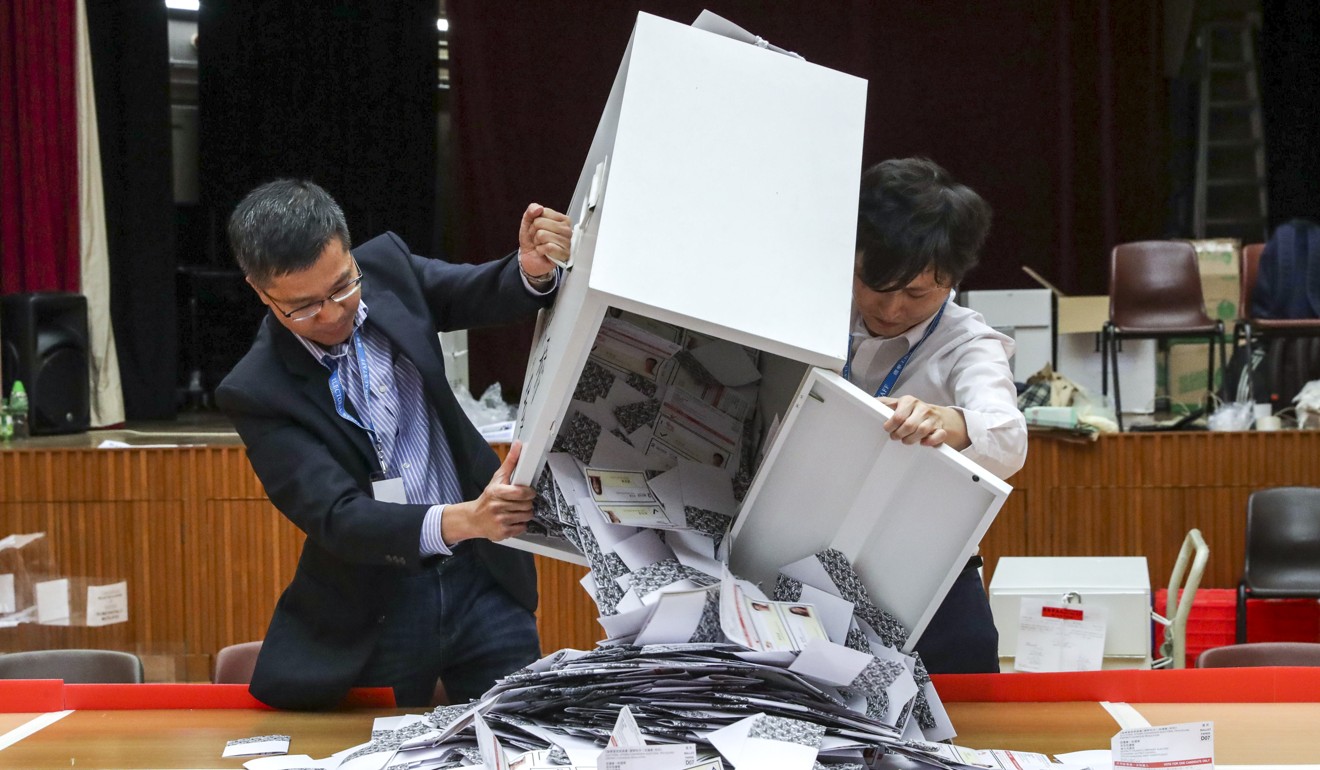
Can polls’ biggest loser become a winner again? Pro-Beijing party must reinvent itself quickly, as it did before
- Party went from massive defeat in 2003 district council polls to big win in Legco elections the following year
- Change will help to shake up leadership, keep government at arm’s length, get a boost from Beijing, observers say
In the wake of more than five months of anti-government protests, the pro-Beijing party won only 21 of the 179 seats it contested. It won 119 in the 2015 polls.
As it happened: pro-Beijing camp licks wounds after defeat in Hong Kong elections
Sunday’s rout was not its first taste of defeat. In November 2003, the party emerged the big loser in district council elections, four months after a 500,000-strong march forced the government to withdraw draft national security legislation commonly referred to as Article 23.
That year, only 62 of its 206 candidates won. But just 10 months later, in September 2004, the party surprised many by making a strong comeback at the Legislative Council elections, winning 12 seats – one more than in the previous election.
With Legco elections due next year, the question is whether the DAB can bounce back from defeat a second time.

Party insiders and observers said much would depend on whether it could keep the government at arm’s length after being punished at the polls for supporting the now-withdrawn extradition bill, which triggered the unrest in June.
It also remains to be seen if Beijing will be as flexible in dealing with Hong Kong now as it was after the 2003 elections.
Pro-democracy bloc vows to turn screw on government after poll wins
A party veteran said the DAB leadership was still coming to terms with its dismal performance on Sunday, and had yet to discuss its next steps, let alone plans to reinvent itself.
“My view is that the party needs to put more emphasis on monitoring the government in the years ahead,” he said.
He also thought “new thinking” was needed to revitalise the 42,596-strong party and find ways to win over middle-of-road voters who might swing between the pan-democratic and pro-establishment camps.
DAB chiefs reject leader Starry Lee’s offer to resign over poll disaster
DAB chairwoman Starry Lee Wai-king said on Monday that she offered to resign to take responsibility for the election defeat, but that was rejected by the central committee.
She is staying on, whereas in 2003, the party’s founding chairman Jasper Tsang Yok-sing quit after its big defeat.

A veteran pro-establishment politician said: “Jasper Tsang insisted on resigning as party chairman in 2003 despite opposition from most central committee members. In hindsight, his resignation helped improve the party’s image.
“The DAB should have the courage to let Starry Lee go, to facilitate the rebuilding of the party.”
Beijing not holding me accountable for election humiliation: Carrie Lam
However, he noted the party’s current crop of leaders was relatively young and had not experienced the ups and downs of changing political fortunes as in the 2000s. Starry Lee, who became chairwoman in 2015, is 45.
Many agree that Tsang’s departure proved critical for the change that followed.
His successor was former teacher Ma Lik, who did not flinch from criticising then chief executive Tung Chee-hwa and declared a new relationship in which the government should no longer expect his party’s cooperation “at any price”.
The DAB had been Beijing’s staunchest ally in Hong Kong since it was founded in 1992 by Tsang, and its unwavering support of Article 23 in 2003 cost it dearly.

Ma’s efforts to reinvent the party were also helped by then vice-president Zeng Qinghong’s conciliatory gestures towards the victorious pan-democratic camp.
Zeng, Beijing’s point man for Hong Kong affairs, declared in June 2004 that he saw no conflict between Beijing and the city’s democratic camp.
As it happened: record number of Hongkongers at district council polls
During a closed-door meeting with a DAB delegation in Beijing in September 2004, Zeng told the DAB that “the party should strive to encompass the interests of the whole community and avoid giving the impression that it fights for the rights of only a particular sector”.
Ma said after that trip: “Mr Zeng may have learned that the people of Hong Kong consider our party too pro-government.”

Ma, who steered his party to its strong performance in the 2004 Legco elections, died in 2007.
Between 2003 and 2007, the DAB also expanded its network of branch offices, with support from pro-Beijing benefactors.
Those expecting Beijing to respond as flexibly now as it did after the 2003 vote may be in for a wait.
On Monday, Beijing brushed aside the pro-establishment camp’s massive defeat, with news of the pan-democratic camp’s big win heavily censored. State media focused instead on calls for law and order to be preserved, accusing Western countries of instigating unrest.
Foreign Minister Wang Yi said in Tokyo on Monday that the elections would not change the fact Hong Kong was part of China, “no matter what happens”.
University of Hong Kong academic Max Wong Wai-lun said he believed Beijing had yet to make up its mind on how to respond to the polls.
“The DAB will face an uphill battle if Beijing sticks to its current hardline approach,” he said.

